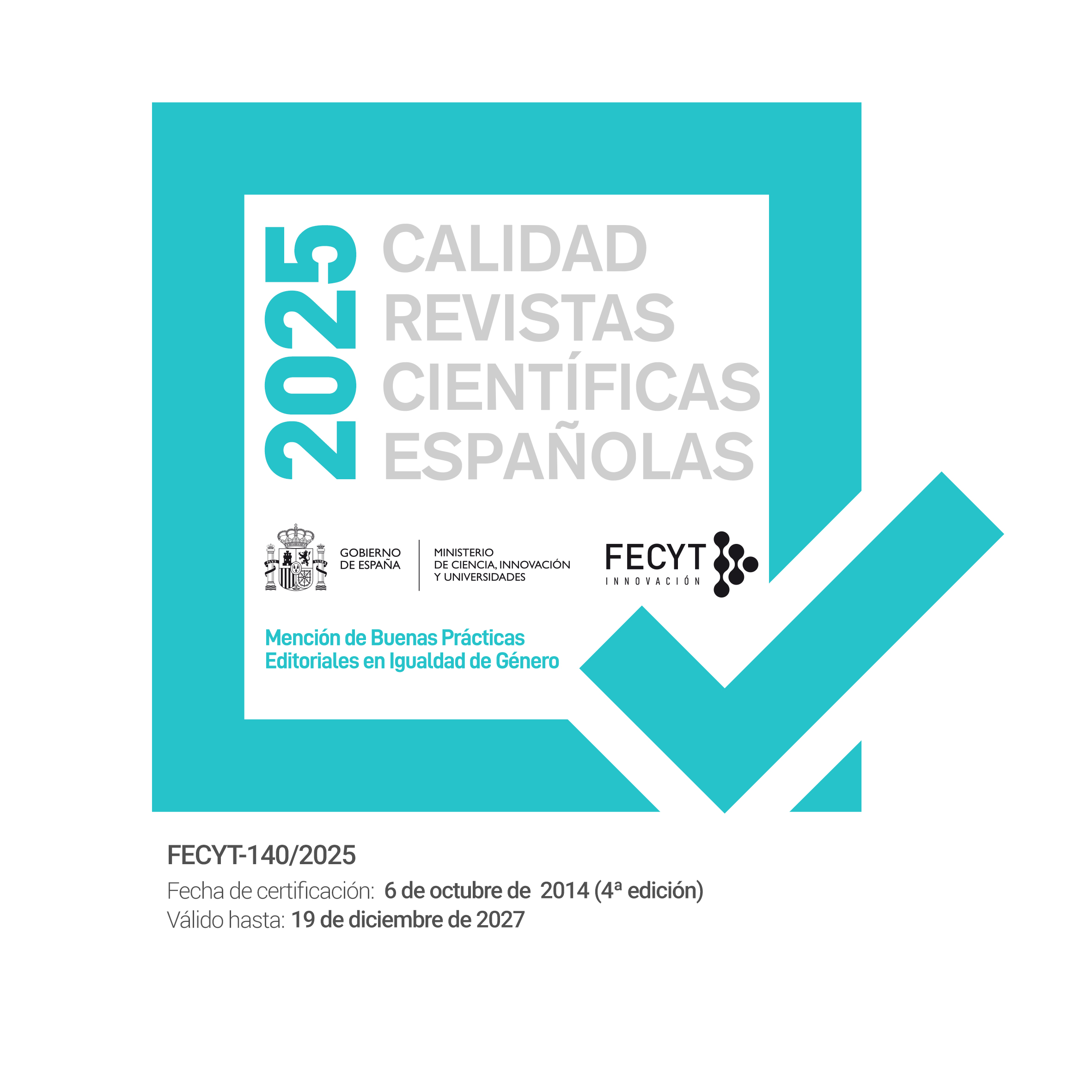Prácticas docentes universitarias y motivación orientada al aprendizaje: efecto mediador de la satisfacción de las necesidades psicológicas básicas
DOI:
https://doi.org/10.5944/educxx1.38203Palabras clave:
aprendizaje, motivación, prácticas docentes, orientación motivacional, necesidades psicológicas básicasResumen
Diversos estudios reconocen la importancia de la relación entre la motivación académica y el aprendizaje en el contexto universitario, lo que contrasta con el menor número de trabajos que abordan la influencia de las variables mediadoras. Esta investigación tuvo como objetivo evaluar el rol mediador de las Necesidades Psicológicas Básicas en la relación entre las prácticas realizadas por profesores universitarios percibidas por los estudiantes como motivadoras y la motivación orientada hacia el aprendizaje. En el estudio participaron 763 estudiantes de programas de salud y educación de diferentes universidades chilenas. Para evaluar el efecto mediador se utilizó la macro PROCESS para SPSS. Los resultados indican que la satisfacción de las necesidades psicológicas básicas media parcialmente el efecto de las prácticas docentes sobre el tipo de motivación orientada hacia el aprendizaje, lo que refuerza la idea de realizar una práctica docente situada, explícita y frecuente con acciones formativas motivadoras que fortalezcan la utilidad, la importancia y la autonomía. Estos hallazgos muestran la relevancia de estas prácticas docentes para generar motivación orientada hacia el aprendizaje, así como el papel de la Satisfacción de las Necesidades Psicológicas Básicas en esta relación.
Descargas
Citas
Abello-Riquelme, R., Del Valle, M., López-Angulo, Y., Sanhueza-Campos, C., & Contreras-Soto, Y. (2022). Lecturers’ Basic Psychological Needs Satisfaction and Its Relationship with Students’ Disposition towards Studying during Online Teaching in the COVID-19 Pandemic. Social Sciences, 11(7), 315. https://doi.org/10.3390/socsci11070315
Babenko, O., & Oswald, A. (2019). The roles of basic psychological needs, self-compassion, and self-efficacy in the development of mastery goals among medical students. Medical Teacher, 41(4), 478-481. https://doi.org/10.1080/0142159X.2018.1442564
Barca, A., Peralbo, M., Almeida, L. S., Brenlla, J. C., Vicente, F., Porto, A., & Morán, H. (2011). Efectos de metas académicas, autoeficacia y estrategias de aprendizaje en el rendimiento de alumnado de secundaria de Galicia y Norte de Portugal Libro de Actas del XI Congreso Internacional Galego-Portugués de Psicopedagoxia, La Coruña. https://core.ac.uk/download/pdf/55615401.pdf
Barrientos-Illanes, P., Pérez-Villalobos, M. V., Vergara-Morales, J., & Díaz-Mujica, A. (2021). Influencia de la percepción de apoyo a la autonomía, la autoeficacia y la satisfacción académica en la intención de permanencia de estudiantado universitario. Revista Electrónica Educare, 25(2), 1-14. https://doi.org/10.15359/ree.25-2.5
Bieg, S., Reindl, M., & Dresel, M. (2017). The relation between mastery goals and intrinsic motivation among university students: a longitudinal study. Educational Psychology, 37(6), 666-679. https://doi.org/10.1080/01443410.2016.1202403
Bircan, H., & Sungur, S. (2016). The Role of Motivation and Cognitive Engagement in Science Achievement. Science Education International, 27(4), 509-529. https://files.eric.ed.gov/fulltext/EJ1131144.pdf
Botnaru, D., Orvis, J., Langdon, J., Niemiec, C. P., & Landge, S. M. (2021). Predicting final grades in STEM courses: A path analysis of academic motivation and course-related behavior using self-determination theory. Learning and Motivation, 74, 101723. https://doi.org/10.1016/j.lmot.2021.101723
Bureau, J. S., Howard, J. L., Chong, J. X. Y., & Guay, F. (2021). Pathways to Student Motivation: A Meta-Analysis of Antecedents of Autonomous and Controlled Motivations. Review of Educational Research, 92(1), 46-72. https://doi.org/10.3102/00346543211042426
Carriedo, A., Cecchini, J. A., Méndez-Giménez, A., Sanabrias-Moreno, D., & González, C. (2023). Impact of Teachers’ Autonomy Support in Students’ Basic Psychological Needs, Intrinsic Motivation and Moderate-to-Vigorous Physical Activity. Children, 10(3), 489. https://www.mdpi.com/2227-9067/10/3/489
Chen, B., Vansteenkiste, M., Beyers, W., Boone, L., Deci, E. L., Van der Kaap-Deeder, J., Duriez, B., Lens, W., Matos, L., Mouratidis, A., Ryan, R.M., Sheldon, K.M., Soenens, B., Van Petergem, S., & Verstuyf, J. (2015). Basic psychological need satisfaction, need frustration, and need strength across four cultures. Motivation and Emotion, 39(2), 216-236. https://doi.org/10.1007/s11031-014-9450-1
Chen, C., Elliot, A. J., & Sheldon, K. M. (2019). Psychological need support as a predictor of intrinsic and external motivation: the mediational role of achievement goals. Educational Psychology, 39(8), 1090-1113. https://doi.org/10.1080/01443410.2019.1618442
Cheon, S. H., Reeve, J., & Marsh, H. W. (2023). Autonomy-Supportive Teaching Enhances Prosocial and Reduces Antisocial Behavior via Classroom Climate and Psychological Needs: A Multilevel Randomized Control Intervention. Journal of Sport & Exercise Psychology, 45(1), 26-40. https://doi.org/10.1123/jsep.2021-0337
Chiu, T. K. F. (2022). Applying the self-determination theory (SDT) to explain student engagement in online learning during the COVID-19 pandemic. Journal of Research on Technology in Education, 54(sup1), S14-S30. https://doi.org/10.1080/15391523.2021.1891998
Deci, E. L., & Ryan, R. M. (2008). Facilitating optimal motivation and psychological well-being across life’s domains. Canadian psychology/Psychologie canadienne, 49(1), 14-23. https://doi.org/10.1037/0708-5591.49.1.14
Deci, E. L., Olafsen, A. H., & Ryan, R. M. (2017). Self-Determination Theory in Work Organizations: The State of a Science. Annual Review of Organizational Psychology and Organizational Behavior, 4(1), 19-43. https://doi.org/10.1146/annurev-orgpsych-032516-113108
Del Valle, M., Matos, L., Díaz, A., Pérez, M. V., & Vergara, J. (2018). Propiedades psicométricas escala satisfacción y frustración necesidades psicológicas (ESFNPB) en universitarios chilenos. Propósitos y Representaciones, 6(1), 301-350. http://dx.doi.org/10.20511/pyr2018.v6n1.202
Elliot, A. J. (2020). Competition and achievement outcomes: A hierarchical motivational analysis. Motivation Science, 6(1), 3-11. https://doi.org/10.1037/mot0000164
Elliot, A. J., & Church, M. A. (1997). A hierarchical model of approach and avoidance achievement motivation. Journal of Personality and Social Psychology, 72(1), 218-232. https://doi.org/10.1037/0022-3514.72.1.218
Elliot, A. J., & Friedman, R. (2017). Approach—Avoidance: A Central Characteristic 01 Personal Goals. In Personal project pursuit (pp. 3-50). Psychology Press.
Elliot, A. J., Dweck, C. S., & Yeager, D. S. (2018). Handbook of competence and motivation (2nd ed.). Guilford Publications.
Frenk, J., Chen, L., Bhutta, Z. A., Cohen, J., Crisp, N., Evans, T., Fineberg, H., García, P., Ke, Y., Kelley, P., Kistnasamy, B., Meleis, A., Naylo, D., Pablos-Mendez, A, Reddy, S., Scrimshaw, S., Sepulveda, J., Serwadda, D., & Zurayk, H. (2010). Health professionals for a new century: transforming education to strengthen health systems in an interdependent world. The Lancet, 376(9756), 1923-1958. https://doi.org/10.1016/S0140-6736(10)61854-5
Gal, B., Sánchez, J., González-Soltero, R., Learte, A., & Lesmes, M. (2021). La educación médica como necesidad para la formación de los futuros médicos. Educación Médica, 22(2), 111-118. https://doi.org/10.1016/j.edumed.20209.008
Guay, F. (2021). Applying Self-Determination Theory to Education: Regulations Types, Psychological Needs, and Autonomy Supporting Behaviors. Canadian Journal of School Psychology, 37(1), 75-92. https://doi.org/10.1177/08295735211055355
Harackiewicz, J. M., Barron, K. E., Pintrich, P. R., Elliot, A. J., & Thrash, T. M. (2002). Revision of achievement goal theory: Necessary and illuminating. Journal of Educational Psychology, 94(3), 638-645. https://doi.org/10.1037/0022-0663.94
Hosseini, L. J., Rafiemanesh, H., & Bahrami, S. (2022). Levels of motivation and basic psychological need satisfaction in nursing students: In perspective of self-determination theory. Nurse Education Today, 119, 105538. https://doi.org/10.1016/j.nedt.2022.105538
Howard, J. L., Bureau, J. S., Guay, F., Chong, J. X. Y., & Ryan, R. M. (2021). Student Motivation and Associated Outcomes: A Meta-Analysis from Self-Determination Theory. Perspectives on Psychological Science, 16(6), 1300-1323. https://doi.org/10.1177/1745691620966789
Hulleman, C. S., Schrager, S. M., Bodmann, S. M., & Harackiewicz, J. M. (2010). A meta-analytic review of achievement goal measures: Different labels for the same constructs or different constructs with similar labels? Psychological Bulletin, 136(3), 422.
Janke, S. (2022). Give me freedom or see my motivation decline: Basic psychological needs and the development of students’ learning goal orientation. Learning and Individual Differences, 96, 102158. https://doi.org/10.1016/j.lindif.2022.102158
Johansen, M. O., Eliassen, S., & Jeno, L. M. (2023). The bright and dark side of autonomy: How autonomy support and thwarting relate to student motivation and academic functioning. Frontiers in Education, 8, 1153647. https://doi.org/10.3389/feduc.2023.1153647
Legault, L. (2017). Self-Determination Theory. In V. Zeigler-Hill & T. K. Shackelford (Eds.), Encyclopedia of Personality and Individual Differences (pp. 1-9). Springer International Publishing. https://doi.org/10.1007/978-3-319-28099-8_1162-1
Liu, W. C., & Sitoe, C. Y. (2020). Student teachers’ psychological needs, subjective experience and perceived competence in teaching during practicum. Asia Pacific Journal of Education, 40(2), 154-166. https://tinyurl.com/liu2020
Mifuturo.cl. (2023). Base Matricula 2023 https://www.mifuturo.cl/bases-de-datos-de-matriculados/
Miranda Ossandón, J., Precht, A., Lobos, C., Valenzuela, J., Muñoz, C., & Del Valle, M. (2023). Enablers and barriers to the construction of motives for learning at the university: the student’s perspective. International Journal of Evaluation and Research in Education (IJERE), 12(4), 1903-1913. https://doi.org/10.11591/ijere.v12i4.25254
Neufeld, A. (2021). Autonomy-Supportive Teaching in Medicine: From Motivational Theory to Educational Practice [version 1]. MedEdPublish, 10(117). https://doi.org/10.15694/mep.2021.000117.1
Osorio Pérez, O., & Moreno Martínez, V. (2022). Habitus académico y obstáculos en la práctica docente. Temas actuales en investigación educativa, 13(24), 00018, https://doi.org/10.32870/dse.vi24.980
Phan, H. P. (2009). Relations between goals, self‐efficacy, critical thinking and deep processing strategies: a path analysis. Educational Psychology, 29(7), 777-799. https://doi.org/10.1080/01443410903289423
Preacher, K. J., Rucker, D. D., & Hayes, A. F. (2007). Addressing Moderated Mediation Hypotheses: Theory, Methods, and Prescriptions. Multivariate Behavioral Research, 42(1), 185-227. https://doi.org/10.1080/00273170701341316
Roth, G. (2019). Beyond the Quantity of Motivation: Quality of Motivation in Self-Determination Theory. En K. Sassenberg & M. L. W. Vliek (Eds.), Social Psychology in Action: Evidence-Based Interventions from Theory to Practice (pp. 39-49). Springer International Publishing. https://doi.org/10.1007/978-3-030-13788-5_3
Ryan, R. M., & Deci, E. L. (2020). Intrinsic and extrinsic motivation from a self-determination theory perspective: Definitions, theory, practices, and future directions. Contemporary Educational Psychology, 101860. https://doi.org/10.1016/j.cedpsych.2020.101860
Schenke, K., Ruzek, E., Lam, A. C., Karabenick, S. A., & Eccles, J. S. (2018). To the means and beyond: Understanding variation in students’ perceptions of teacher emotional support. Learning and Instruction, 55, 13-21. https://doi.org/10.1016/j.learninstruc.2018.02.003
Schunk, D. H., Judith L. Meece, & Pintrich, P. R. (2015). Motivation in education: Theory, research, and applications (4th ed.). Pearson.
Senko, C. (2019). When do mastery and performance goals facilitate academic achievement? Contemporary Educational Psychology, 59, 101795. https://doi.org/10.1016/j.cedpsych.2019.101795
Shrout, P. E., & Bolger, N. (2002). Mediation in experimental and nonexperimental studies: New procedures and recommendations. Psychological Methods, 7(4), 422–445. https://doi.org/10.1037/1082-989X.7.4.422
Taber, K. S. (2018). The Use of Cronbach’s Alpha When Developing and Reporting Research Instruments in Science Education. Research in Science Education, 48(6), 1273-1296. https://doi.org/10.1007/s11165-016-9602-2
Urdan, T., & Kaplan, A. (2020). The origins, evolution, and future directions of achievement goal theory. Contemporary Educational Psychology, 101862. https://doi.org/10.1016/j.cedpsych.2020.101862
Valenzuela, J., Miranda Ossandón, J., Muñoz, C., Precht Gandarillas, A., Del Valle, M., & Vergaño-Salazar, J. G. (2024). Learning-oriented motivation: Examining the impact of teaching practices with motivational potential. PLoS ONE, 19(2), e0297877. https://doi.org/10.1371/journal.pone.0297877
Valenzuela, J., Muñoz, C., & Miranda, J. (2021). Motivos que dan sentido al aprendizaje escolar: la mirada de los profesores. Educar, 57(1), 173-187. https://doi.org/10.5565/rev/educar.1146
Valenzuela, J., Muñoz, C., Miranda-Ossandón, J., & Lobos, C. (2022). Prácticas docentes motivadoras en la enseñanza superior: el caso de los programas de salud y pedagogía. Revista Electrónica Interuniversitaria de Formación de Profesores - REIFOP, 25(3), 29-42. https://doi.org/10.6018/reifop.525551
Valle, A., Cabanach, R. G., Rodríguez, S., Núñez, J. C., & González-Pienda, J. A. (2006). Metas académicas, estrategias cognitivas y estrategias de autorregulación del estudio. Psicothema, 18(2), 165-170. http://psicothema.com/pdf/3193.pdf
Vansteenkiste, M., Lens, W., & Deci, E. L. (2006). Intrinsic Versus Extrinsic Goal Contents in Self-Determination Theory: Another Look at the Quality of Academic Motivation. Educational Psychologist, 41(1), 19-31. https://doi.org/10.1207/s15326985ep4101_4
Vansteenkiste, M., Ryan, R. M., & Soenens, B. (2020). Basic psychological need theory: Advancements, critical themes, and future directions. Motivation and Emotion, 44(1), 1-31. https://doi.org/10.1007/s11031-019-09818-1
Vergara-Morales J. & Del Valle M. (2021) From the Basic Psychological Needs Satisfaction to Intrinsic Motivation: Mediating Effect of Academic Integration. Frontiers in Psychology, 12, 612023. http://doi.org/10.3389/fpsyg.2021.612023c
Wild, S., Rahn, S., & Meyer, T. (2023). The relevance of basic psychological needs and subject interest as explanatory variables for student dropout in higher education — a German case study using the example of a cooperative education program. European Journal of Psychology of Education. https://doi.org/10.1007/s10212-022-00671-4
Zhou, M., Adesope, O. O., Winne, P. H., & Nesbit, J. C. (2019). Relations of multivariate goal profiles to motivation, epistemic beliefs and achievement. Journal of Pacific Rim Psychology, 13, Article e1. https://doi.org/10.1017/prp.2018.28

Descargas
Archivos adicionales
Publicado
Cómo citar
Número
Sección
Licencia
Derechos de autor 2024 Milenko Del Valle, Jorge Valenzuela, Carla Muñoz, Jorge Miranda-Ossandón, Juan Gabriel Vergaño-Salazar, Andrea Precht

Esta obra está bajo una licencia internacional Creative Commons Atribución-NoComercial 4.0.
La revista Educación XX1 se publica bajo licencia Creative Commons Reconocimiento-NoComerciaL 4.0 (CC BY-NC 4.0). Se permite la generación de obras derivadas siempre que no se haga un uso comercial. Tampoco se puede utilizar la obra original con finalidades comerciales.










